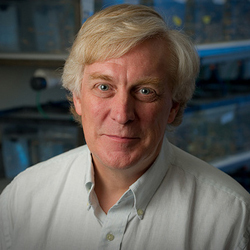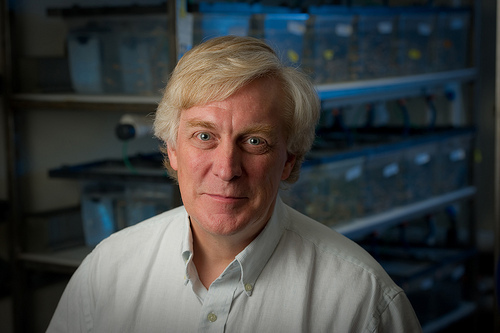

David Hyde, The Rev. Howard J. Kenna, C.S.C., Memorial Director of the Zebrafish Research Center and professor of biological sciences, has received the 2013 Father James. L Schilts, C.S.C./ Doris and Eugene Leonard Teaching Award. He will receive this award at the annual Dean’s Award Luncheon on May 17. Hyde received several glowing recommendations from faculty and students for this teaching award.
Every fall, Hyde teaches Classical and Molecular Genetics, which is considered the cornerstone course of the biological science major and often cited as the most challenging course of the undergraduate biology curriculum.
Michelle Whaley, teaching professor of biological sciences, has taught with Hyde for the last 19 years. “I have seen a major transformation in David’s teaching over the years because he seeks to improve and innovate each year,” she said in her recommendation letter. “However, one thing has remained constant. He intellectually challenges the students far beyond what they think they can accomplish, and he teaches them advanced scientific problem solving skills. Our majors thus develop a level of intellectual independence and critical thinking that is truly amazing.”
“I certainly was challenged in his course, but I always felt like Dr. Hyde wanted me to succeed and was willing to provide the support I needed to do so,” explained sophomore Rebecca Noble. “He set the standards high because he knew that if we pushed ourselves, we could meet and exceed them.”
In the spring, Hyde volunteers as a group mentor for Whaley’s Cell Biology Laboratory course. This is a full-semester commitment mentoring a group of sophomore biology students in high-level research projects. “He has always been willing to participate in this innovative undergraduate laboratory course and has helped make it a resounding success,” said Gary Lamberti, professor and chair of the Department of Biological Sciences. “This part of his teaching receives little recognition, but in fact is very demanding of his time and energy. He does it willingly and with great dedication and commitment. The course would cease to function if it were not for faculty such as David who assist immeasurably in running a very strong course.”
In addition to teaching undergraduates in the classroom, Hyde is very dedicated to undergraduate research. He currently has 11 undergraduate students in his laboratory, when most biology labs have two to three students, and has had an average of four undergraduate researchers in his labs every semester since coming to Notre Dame in 1988. Nineteen of these researchers have also been authors on published papers from his lab group. “I feel extraordinarily privileged to work under his leadership, as his brings many of the same traits from teaching that he does to the organization and progress of his lab,” said Clare Yarka. “He guides me but at the same time challenges me to think critically and analytically. The accessibility and level of personal interest that Dr. Hyde brings as a P.I. is unrivaled, and I feel lucky.”
Hyde has been recognized several times over the years for his excellence in undergraduate teaching. He earned the Kaneb Faculty Teaching Award in 1999 and 2005, and was named a Kaneb Faculty Teaching Fellow in 2002.
“Dr. Hyde is an intelligent, motivated man with a gift for teaching,” described sophomore Eric Donahue. “The amount of time and effort he devotes to his students is a hallmark of his effectiveness as a teacher. He has inspired me to follow my dreams in the sciences and is clearly the most deserving professor for this award.”